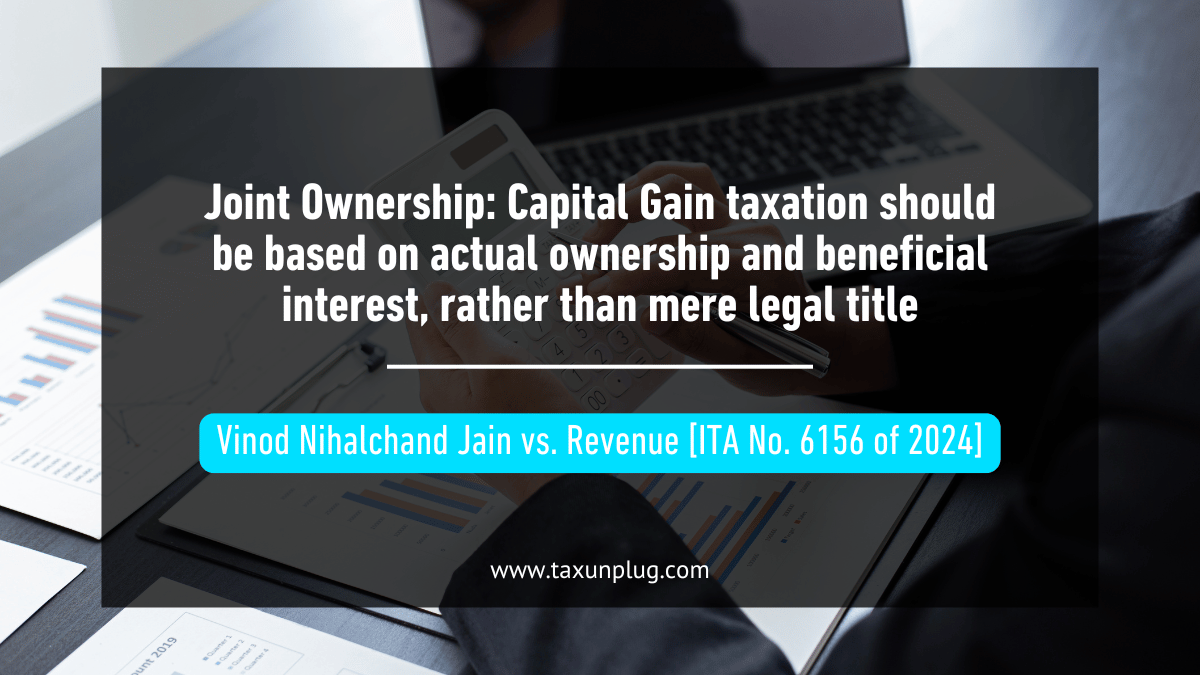Joint Ownership and Capital Gain Taxation:
Vinod Nihalchand Jain vs. Revenue [ITA No. 6156 of 2024]
Background of the Case
The appellant, Vinod Nihalchand Jain, did not file his income tax return for the assessment year 2015-16, as his taxable income was below the basic exemption limit. However, the AO received information that the appellant had sold an immovable property during the year for Rs. 54 lakh, consequently, the AO initiated reassessment proceedings under Section 147 of the Income Tax Act, 1961.
The property was originally purchased on 23.06.2004 by the appellant’s brother, Babulal Nihalchand Jain, who paid the entire consideration. Out of natural love and affection, the appellant and his father were added as joint owners in the purchase deed. The property was sold on 19.09.2014, and the entire sale consideration was credited to the brother’s bank account.
Subsequently the appellant filed an appeal before CIT(A), where addition made by AO was upheld but directed the AO to consider the cost of acquisition and improvement while computing capital gains.
Arguments by the Appellant
The appellant argued that the property was purchased entirely by his brother, and the appellant’s name was added as a joint owner out of natural love and affection. The appellant had no beneficial interest in the property, as evidenced by the fact that the entire sale consideration was received by his brother. The brother had declared the sale consideration in his income tax return and claimed exemption under Section 54F for purchasing another property. Further the appellant also submitted supporting documents, including the purchase deed, bank statements, and an affidavit from his brother confirming that the appellant had no financial interest in the property.
Respondent’s Response
The respondent stated that the appellant was a joint owner of the property, and his name appeared in the sale deed. The respondent also highlighted that after the father’s demise, the appellant and his brother had equal shares in the property. Since the appellant had not relinquished his rights, 50% of the sale consideration was taxable in his hands as long-term capital gains. Even though the entire sale consideration was credited to the brother’s bank account, however the appellant was still legally entitled to 50% of the proceeds.
Court Findings and Decision
The ITAT bench of Mumbai acknowledged that merely having a name on a property document does not establish beneficial ownership. Since 100% of the purchase consideration was paid by the appellant’s brother, and the brother solely declared the capital gains in his ITR, the appellant had no real ownership interest in the property.
ITAT also referred to past judicial rulings, highlighting that income tax liability should be imposed based on real ownership and financial transactions, not just legal title.
Since the appellant was not the beneficial owner of the property, the addition of Rs. 27 lakh as long-term capital gains in his hands was unjustified. The ITAT deleted the addition and allowed the appellant’s appeal.
Joint Ownership and Capital Gain Taxation
To download official order, Click Here“The site is for information purposes only and does not provide legal advice of any sort. Viewing this site, receipt of information contained on this site, or the transmission of information from or to this site does not constitute an attorney-client relationship. The information on this site is not intended to be a substitute for professional advice.”

